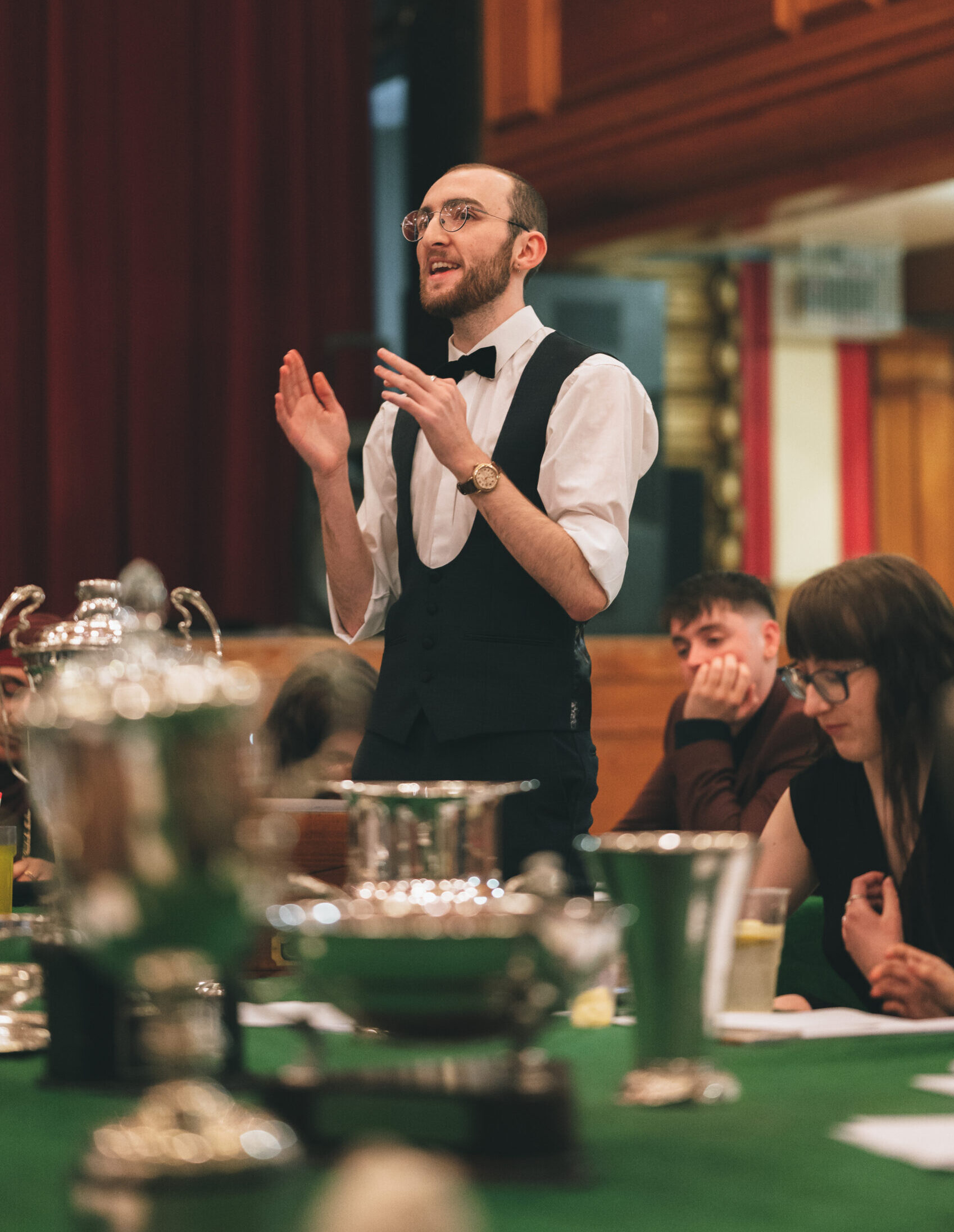At Trinity College Dublin, in the fifth debate of the day, my partner and I needed to win outright to advance to the final. We had 15 minutes to prepare two seven-minute speeches, in the British Parliamentary debating style.
We had to place first out of the four teams competing to guarantee advancing to the next round of the competition.
The motion was on international development finance. Two teams support the motion, two teams oppose the motion, you don’t get to decide which.
We were the second team to oppose the motion, so would be the last to speak. The opening teams spoke well but were beatable. Then the second team’s first speaker stood up, and smugly told the room that this was his exact doctoral topic, and he knew everything there was to know about it.
My heart sank. There was no way we were going to progress past this round. Then he began to speak.
I realised that while he was undoubtedly knowledgeable about the subject, he wasn’t very good at debating. The formulation of his ideas were difficult to follow, he didn’t tie them directly back to the debate we were having, he didn’t land the impact of his points, and was overly flippant in responding to the opposition.
Our turn came to speak, and despite knowing very little about international development finance compared to someone writing their PhD on the subject, we won the debate and advanced.
I could imagine the PhD student angrily writing off debating after this, believing that his loss demonstrated its hollowness – that you can beat an expert on a subject with little more than sophistry.
However with equal skill the PhD student would have easily beaten us. He had more, and better, information, but simply did not communicate the ideas well.
In a less formalised way, this happens all the time. Expert opinion loses out to well-presented bluster constantly.
Without technique bad ideas can win arguments. Therefore in my opinion more ought to have those technical skills.
The importance of these skills becomes heightened in democracies when people’s lives are decided by the outcomes of debates. And while many political figures do posses some debating skills, many do not and few have them all.

Joseph Hutchison debating in action.
So what are these skills, and who puts them to good use?
Rhetoric
Strong rhetoric is made by effective utilisation of emotive language and style. Humour and anger work well, but the core bases of strong rhetoric are authenticity and good intuition for what emotional notes to strike. Rhetoric will persuade people not based on the strength of the idea they’re selling but the way they make you feel when you listen to them. Donald Trump does this extremely well. Strong rhetorical oration helped move Trump to the US presidency in 2016 and the now presumed Republican nominee for President despite facing over 90 counts of felony. Although originally coined by former US President Richard Nixon, Make America Great Again was weaponised as an excellent piece of rhetoric by Trump.
Rebuttal
Rebuttal deals with bad ideas effectively. It is often done well with inversion of ideas, reductio ad absurdum, undermining the premises on which an argument is made, and a quick ability to identify if and when a fallacy is deployed. The effect of a good rebuttal is to ensure that bad ideas do not get taken seriously. A figure who utilises this well, and likely will play a significant role in the outcome of the upcoming General Election is Andrew Neil. Neil is happy to tell the public he’s so good at his job, in part, because of his debates training (telling Jacob Rees Mogg his cheap tricks wouldn’t work because he “went to a tougher debating chamber than him”, for example). He has been tearing apart weak political arguments for decades with analytical rigour and fury which tears away the credibility of all but the most robust ideas.
Framing
This is the skill of positioning an argument. This is typically done through contextual frameworks such as the history underlying an argument or aspects of human nature (i.e. what do people actually want) to put an argument in context. This redefines the scope of the argument in terms favourable to you. At its best this allows you to win without making an argument, but shifting the battleground. Although not famous for debating skill, Labour’s shadow chancellor Rachel Reeves has been hugely effective in framing the debate around the economy, the dividing lines between the Conservatives and Labour and what the parameters for a debate around economics look like.
Impacting
To make an argument impactful is to show its significance relative to other arguments, with the goal of making your point seem the most important. A figure who utilises this well is current US President Joe Biden. Although not a brilliant natural orator in his advanced age and with a re-emerged stammer, he is still able to effectively articulate the magnitude of the problems facing American democracy, particularly the risk of a Trump presidency, as well as the wars in Ukraine and Israel/Palestine. For example, his references to Trump as “a threat to the soul of this country” or having “placed a dagger at the throat of our democracy”.
Tracking
Usually achieved with the ability to condense complex information into simple and understandable points. This results in the ability to follow a debate, and the substance of it, with enough precision to be able to tease out weak arguments from strong ones. Lewis Goodall of LBC, formerly of Newsnight, is analytically rigorous in evaluating the exact meaning and substance of an argument. A vital skill for journalists, but also a necessary one for the public to understand what’s going on for a healthy democracy.
In this year of elections, these skills will prove to be more important than ever. And it’s not just politicians who need them.
From communications professionals to business leaders and everyone in between, being able to communicate clearly and effectively is a vital skill.
Whether you’re in front of a room full of people presenting an idea or leading a business through a crisis, constituent elements of debating shine through and mark skilled communicators out.
Practical commitment to learning and honing these tools can take ineffective communicators to exceptional ones. Without them, you can end up losing a debate on your subject of expertise to someone who knows very little about it.




